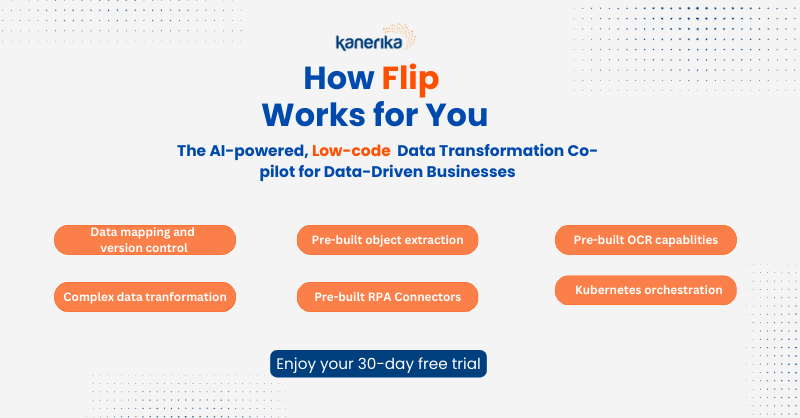Data automation is changing the insurance industry for the better. A study by McKinsey predicts up to 30% of the underwriting roles could be automated by 2030. The benefits of data automation are enabling insurance companies to turn to automated Business Intelligence (BI) tools to boost efficiency.
Adopting these tools has become an industry-wide trend as insurers seek to extract maximum value from the vast amounts of data.
However, the volume and complexity of available data are a huge challenge. Fortunately, the rise of data automation is transforming how insurers collect, analyze, and apply data to improve their operations.
Data automation enables insurers to stay competitive in a rapidly evolving market, from underwriting to claims processing, risk management, and customer experience.
What is Data Automation
Data automation is the process of uploading, handling, and processing data using automated data processing tools. Compared to traditional data processing, they require minimal to no coding and provide numerous benefits in reduced errors, faster processing times, and a much more efficient data flow overall.
Data automation has three components: Extract, Transform, and Load.
- Extract – as the name suggests, this step involves extracting data from different databases.
- Transform – the process of modifying the data, such as converting a CSV file.
- Load – the task of loading the data into the target system.
Benefits of Data Automation
Data automation has numerous benefits for the insurance industry and helps increase company profitability and efficiency. Here are the most significant benefits of using a data automation tool for insurance:
Faster Claims Processing
For insurance companies, an efficient claims process is essential for customer satisfaction. However, claims processing can often be slow and laborious. The reason for this: claims processing requires the collection and verification of information from a variety of sources, such as medical records, photographs, and police reports.
In addition, using outdated technology can further complicate the process and cause delays, resulting in a poor customer experience.
This is where data automation can make a real difference. Insurers can streamline the claims process and reduce errors by automating data collection, verification, and analysis from different sources. Business Intelligence tools help insurers provide their customers with a better claims experience and to gain a competitive edge in the market.
Also Read – 10 Use Cases for Leveraging RPA in Insurance
Also Read – Automation In Insurance: Use Cases, Benefits, and Strategies
More Efficient Underwriting
Underwriting and pricing are crucial components that determine an insurer’s success. The process of underwriting involves risk analysis associated with a particular policy and deciding whether to provide coverage. This process can be time-consuming and labor-intensive, involving gathering and analyzing data from various sources.
However, the advent of automation in underwriting and pricing has made the process faster and more efficient. By implementing intelligent data collection and analysis solutions, insurers can speed up functions such as risk assessment, pre-population of data fields, and reviewing customers’ claims history to make better recommendations.
Automating the underwriting process saves time and resources and improves accuracy, leading to more informed decision-making.
Improved Policy Management
The process of issuing a policy involves several pre-underwriting checks and decisions. However, once the underwriting decision is made, the policy still needs to be issued, and information must be updated in internal systems and communicated to the customer.
Automation can significantly impact this, freeing up valuable resources for other tasks.
Data automation can significantly improve the handling of policy updates such as address changes or bank details. Automation solutions that utilize machine learning can extract and process these requests from various sources, such as emails and chat, making all necessary changes in internal documents.
Policy management presents an excellent opportunity to streamline operations and improve customer experience by adopting Business Intelligence tools.
Also Read- Standardized Data Organization in Insurance systems using RPA
Reducing Regulatory Errors
According to the 2022 Thomson Reuters Global Cost of Compliance Survey, respondents have expressed dissatisfaction with the increasing demands of compliance duties, which are expanding with time.
However, they believe their staffing numbers are unlikely to grow, primarily due to the rising costs of maintaining employees and tight budgets.
Intelligent data automation is emerging as the preferred solution for companies seeking to enhance compliance. Manual operations can be prone to human errors, which increase the risk of breaches.
Data automation solutions ensure data accuracy and track a complete log of their actions. Insurers can monitor regulatory compliance in real time through internal reviews and be prepared for external audits.
Insurance companies can eliminate the need for employees to go through routine manual tasks, reduce the risk of compliance breaches, and improve their overall compliance standards.
Read More – 7 Big Data Use Cases and Trends In Insurance
Why does Insurance Need to Embrace Data Automation?
The impact of data automation and DataOps on the insurance industry has been significant. Insurers have been able to use data to understand their customers better, leading to providing targeted products and services. They have also identified patterns and trends in their data, which can be used to identify new business opportunities and improve the overall customer experience.
Furthermore, data automation and DataOps have enabled insurers to reduce costs and improve efficiency. By automating routine tasks and streamlining data processing, insurers have been able to free up resources and focus on customer engagement and risk management.
Also Read- Google Gemini AI: Your Superpowered AI Assistant for the Future
In addition, the use of data automation and DataOps has led to the development of better risk models. This has enabled insurers to calculate premiums accurately, reduce fraud, and identify potential risks. Enabling this move has benefited insurers and policyholders who can buy more personalized insurance products.
Insurance companies wishing to remain competitive and profitable must prioritize collecting and managing data, utilizing data, and developing data automation as core business practices.
The following are additional imperatives for the insurance industry:
- Gain more knowledge about the insurance marketplace compared to their competitors.
- Obtain more information about their customers, whether consumers or commercial businesses, than their rivals.
- Share and make use of information quickly across the organization and avoid data silos.
- Handle higher analytics workloads as demand increases from all segments of the business.
- Respond promptly to evolving legislation and respect data privacy laws.
- Incorporate 360-degree analytical insights in decision-making, including pricing, risk management, underwriting, claims processing, and offering satisfactory customer experience.

Current Insurance Industry Trends
- According to research firm Gartner, almost 60% of insurance executives report increased funding in digital innovation brought on by the pandemic, a trend that could continue until 2025.
- Over 50% of top insurance decision-makers consider Big Data analytics and IoT as the top two technologies necessary for digital transformation in the next three years.
- The two most significant challenges cited by respondents are increasing data complexity and competition against disruptors, such as InsurTech startups (both slightly over 30%).
- A little more than a quarter feel internal resistance to technology adoption, and increased data silos are also critical challenges for the insurance sector.
- Over 50% of respondents said their data management operation is to some degree sophisticated, effectively managing their data but still facing some data silos.
- Nearly half of the respondents (43%) consider their data management operations “highly sophisticated,” with state-of-the-art data pipelines that feed the entire business with clean, usable, and contextualized data.
Also Read- Data Transformation – Benefits, Challenges and Solutions in 2024
FLIP Your Data Game: Boost Efficiency and Accuracy with our Zero-Code Tool

FLIP is a state-of-the-art data automation tool from Kanerika. Insurance companies can use it to streamline their processes and reduce costs.
One of the key benefits of FLIP is that it is a zero-code platform, meaning users do not need any coding knowledge to use it. This makes it easy for anyone in the organization to use FLIP and automate their tasks.
Additionally, FLIP is a cost-effective tool compared to other data automation tools in the market, making it an attractive option for insurance companies of all sizes. Deploying FLIP can be up to 50% more cost-effective than other data tools.
FLIP comes pre-configured with the most updated data templates available for the insurance industry in the market. This ensures companies can sign up and automate their data immediately instead of creating new data fields and sequences to optimize their data outputs.
Sign up for FLIP today and start harnessing the power of data like never before!











